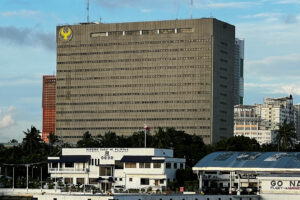




January Economic Update: Growth slows, prices rise
 DOWNLOAD
DOWNLOAD

Inflation Update: Up, up, and away?
 DOWNLOAD
DOWNLOAD

Quarterly Economic Growth Release: Growth takes on a slower pace
 DOWNLOAD
DOWNLOAD


BSP bullish on banking sector outlook

The Philippine banking sector is seen to continue its growth trajectory amid expectations of rising loan activity, the Bangko Sentral ng Pilipinas (BSP) said.
“The Philippine banking system sustains its growth momentum, recording solid performance in line with improved economic conditions,” it said in its latest report on the Philippine Financial System.
“Increasing credit activity is likely to continue as demand remains firm, supported by strong macroeconomic fundamentals.”
Data from the central bank showed that gross total loans jumped by 12.4% annually to PHP 14.3 trillion as of June.
Broken down, real estate was the top recipient of loans (18.3% or PHP 2.6 trillion) followed by households (13.3% or PHP 1.9 trillion), wholesale and retail trade (10.5% or PHP 1.5 trillion), electricity, gas, steam and air-conditioning supply (9.11% or PHP 1.305 trillion), and manufacturing (9.06% or PHP 1.297 trillion).
“Expansion in assets, loans, deposits, and earnings continued, enabling banks to support the growing demand of their clients as well as contribute to the development of the economy through financing of key productive sectors in the country, including households.”
Banks’ credit-to-gross domestic product (GDP) ratio stood at 56.4% in June, improving from the 54.9% a year earlier.
“Banks are well capitalized and highly liquid, with key risk-based capital and liquidity ratios above regulatory standards,” the central bank added.
BSP data showed the banking industry recorded PHP 19.5 trillion in deposits at end-June, up by 9.5% from a year prior. Banks’ capital base also grew by 10.6% year on year to PHP 3.2 trillion from PHP 2.9 trillion.
“This solid performance was accompanied by ample capital and liquidity buffers that exceeded domestic and global standards, allowing banks to support their expanding operations and risk-taking activities.”
Meanwhile, banks were also able to “provide strong credit support to marginalized and priority sectors in the country, contributing to the continued promotion of inclusive growth for all Filipinos,” the BSP said.
Preliminary data showed banks allocated PHP 1.7 trillion of their total loanable funds for agriculture, fisheries, and rural development financing as of June.
Earlier data from the BSP also showed that financing for micro, small, and medium enterprises rose to PHP 488.1 billion at end-June, higher than the PHP 461.4 billion in the same period a year ago.
“Loan quality remained satisfactory despite the increase in nonperforming loans. The combined effect of challenges from post-pandemic recovery and elevated borrowing costs due to the high interest rate environment affected the paying capacity of both business and individual borrower,” the BSP added.
Reforms
Meanwhile, the central bank said it will continue to implement the necessary policy reforms to support the banking system.
“The BSP’s strategic priority areas will continue to guide the prudential measures that would help equip banks and other supervised financial institutions to rise and navigate the challenges posed by an evolving banking landscape.”
It said it will “enhance its corporate governance and risk management standards to safeguard institutional stability and resilience.”
“These initiatives complement the existing supervisory frameworks, which consider the supervised entities’ business model, risk profile and significant activities,” it added.
The central bank recently issued guidelines for banks’ operational resilience standards to strengthen their ability to manage and mitigate the impact of potential disruptions to ensure the continuous delivery of services.
“The BSP will also strengthen its macroprudential oversight and enhance the stress testing exercise to complement these reforms,” it added.
The central bank will also push for efforts to promote digital transformation in the financial system.
“Parallel to this, the BSP will issue regulations on digital financial marketplace, enabling banks and other qualified BSP-regulated/supervised entities to form strategic and meaningful partnerships with other financial service providers,” it said.
“This will allow them to offer a range of select financial products and services through a one-stop-shop digital platform.”
The BSP added that it will explore the use of artificial intelligence for financial services and amend regulations on sustainability disclosure requirements, among other initiatives. –Luisa Maria Jacinta C. Jocson, Reporter
This article originally appeared on bworldonline.com





 By BusinessWorld
By BusinessWorld